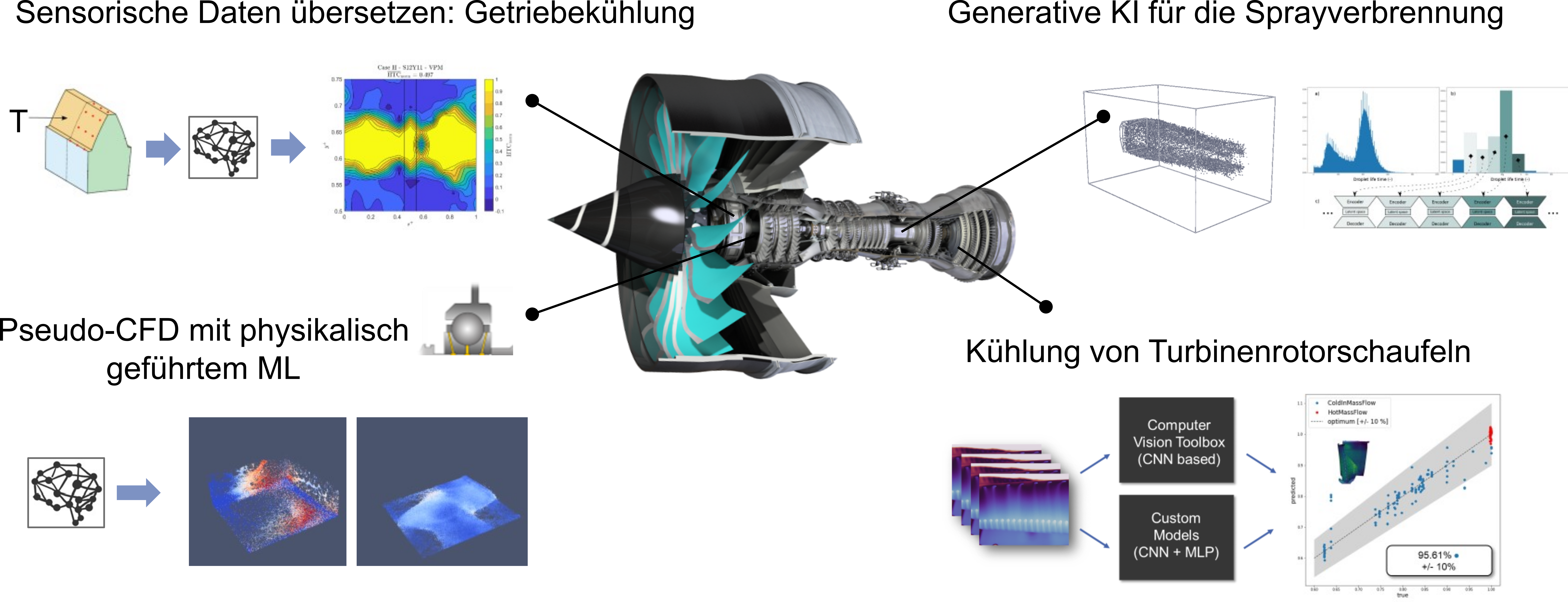Research at the Institute of Thermal Turbomachinery at the Karlsruhe Institute of Technology focuses on turbomachinery. This primarily includes aircraft engines and gas and steam turbines for energy conversion. Within the machines, the research work focuses on the "hot" parts of the machines. In addition to the combustion chamber and the high-pressure turbine, this also includes the secondary air and oil system. Hydraulic turbomachinery such as pumps and fans of various types are also the subject of current research. Accordingly, the institute is divided thematically into four working groups:
Air and oil system
Head: Dr.-Ing. Corina Schwitzke
The efficient provision of cooling air, the reduction of sealing air and gap losses and the optimal cooling of the thermally highly stressed rolling bearings require highly innovative components in the secondary air and oil system, which are analyzed at the Institute of Thermal Fluid Machinery using state-of-the-art methods. The results are then incorporated into the design process of future engines in the form of optimized calculation methods and thus contribute to the implementation of the ambitious goals in aviation.
Current research topics
| Sealing System | Gearbox |
|
|
| Power Skiving | Bearing chamber |
|
|
Combustion and two phase flow
Head: Dr.-Ing. Rainer Koch

Passenger jets will continue to fly with liquid fuels in the medium term. Electric drives or the use of hydrogen will only be used in the distant future. It is more likely that engines will continue to use CO2-neutral liquid fuels for the time being. To reduce pollutant emissions from combustion in aircraft engines, exhaust gas aftertreatment cannot be used for weight reasons and due to the high mass flows. For this reason, all manufacturers are developing new combustion concepts that can reduce the proportion of pollutants in the exhaust gas by up to 50 %. The Combustion and Two-Phase Flow Group at the Institute of Thermal Turbomachinery is working on the design and optimization of such low-emission combustion chambers for future gas turbines. Particular attention is paid to the injection of the liquid fuel, as the size and speed of the fuel droplets formed have a decisive influence on pollutant emissions. Laser measurement technology is used to experimentally investigate the flow, the injection of liquid fuels and the formation of pollutants. In parallel, numerical methods for prediction are being developed, including an SPH In-house code.. State-of-the-art visualization methods such as virtual reality are also used.
Heat transfer and cooling methods
Head: Dr.-Ing. Jonas Schmid
The highest efficiencies of future gas turbines can be achieved by further increasing the turbine inlet temperature. Today, these temperatures are already far above the melting temperature of available materials for the combustion chamber and turbine blades, making intensive cooling necessary. New cooling concepts are therefore being developed at the Institute of Thermal Turbomachinery with the help of targeted experiments and numerical investigations. The focus here is on heat transfer, cooling effectiveness and optimization of aerodynamics.
Machine intelligence in energy systems
Head: Dr. Cihan Ates
The energy landscape is undergoing irreversible change due to technological advances, growing environmental awareness, changing consumer behavior, new regulations, changing availability and pricing of fuels, and the limited availability of resources. Today, direct communication between "things" offers the opportunity to develop intelligent energy systems and dissolve the boundaries between the physical, digital and biological worlds. On the threshold of this new research era, we are developing new methods for solving complex, multivariate optimization problems for practical technical applications.
Our current research focuses on five topics: (i) clean combustion technologies, (ii) AI-powered multi-scale simulations of transportation phenomena, (iii) learning theory, (iv) AI-powered scientific visualization, and (v) smart sensors and wearables for condition monitoring.

Hydraulic turbomachinery
Head: Dr. Balazs Pritz
Fans and pumps are not only used millions of times in industry, they are also part of a large number of devices in our daily lives. For this reason alone, the need for energy optimization is obvious. Due to increasing computing power, numerical simulations (Computational Fluid Dynamics, CFD) are being used to an ever greater extent to replace time-consuming and expensive experiments. CFD allows insights into the flow where experimental measurements fail. However, numerical models must always be able to be measured against reality and must therefore undergo thorough validation in experiments. The Hydraulic Fluid Machinery working group deals with both experimental and numerical investigations. In this way, the machines are designed and optimized for different boundary conditions.

